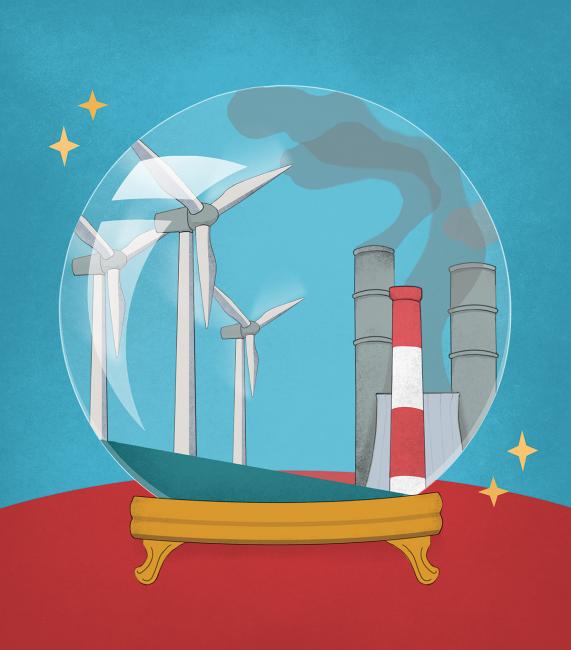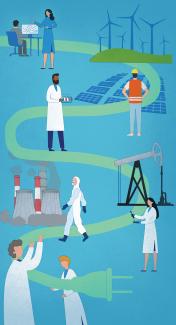Virtually every school at Tulane is conducting research on, teaching about and embracing the clean energy movement in some way. Five schools in particular — Science and Engineering, Architecture, Liberal Arts, Law and the A. B. Freeman School of Business — have begun new initiatives that address changing energy sources.
The Next Generation
When the opportunity to become the first Entergy Chair of Clean Energy at Tulane presented itself in 2014, Daniel Shantz was working as a senior manager at SABIC, a Saudi Arabian multinational chemical manufacturing company. Having also spent several years as a chemical engineering professor at Texas A&M University, Shantz believed his background suited him well for this new role.
That he also missed academia, made the decision that much easier and he happily joined the Department of Chemical and Biomolecular Engineering to help lead the School of Science and Engineering’s 10-year strategic focus on energy, the environment and sustainability. Based on the work he and his team have done since arriving at Tulane, Shantz clearly made the right decision.
That work includes developing next-generation materials to reduce harmful automotive emissions and researching ways to convert benzene to phenol in one step instead of the complicated multistep process now being used. Phenol is commonly used in plastics, and Shantz said that a direct conversion would require less energy, emit less carbon dioxide and lead to less waste.
Another program in the Shantz Lab is chemical recycling of waste polyethylene and polypropylene. Global production of these two plastics is over 100 million tons per year, and close to 80% of this plastic used in the U.S. is landfilled, Shantz said.
“This represents an environmental problem on multiple levels as landfilling these is undesirable and represents wasting a high-value source of carbon,” Shantz said. “The Shantz Lab is exploring how to convert these waste plastics into molecules that can be integrated as feedstocks for existing chemical and refining technologies to further upgrade them into liquid fuels or reconverted back into plastics.”
Last year, Tulane was selected to lead one of three $18 million U.S.-Israel Energy Centers aimed at improving the safety, efficiency and sustainability of offshore natural gas production. The five-year initiative of the U.S. Department of Energy and Israel’s Ministry of Energy will work in partnership with industry to develop and deploy new and critical technologies for fossil energy, energy storage and energy-water nexus sectors. Tulane is a partner with Hebrew University of Jerusalem in the fossil fuel energy consortium.
Given the goal of net-zero emissions by 2050 as set out in the Paris Climate Agreement, Shantz said the pressure is on to come up with solutions that will greatly reduce the amount of carbon dioxide and other carbon compounds emitted due to the consumption of fossil fuels. That’s where the U.S.-Israel Fossil Energy Center could have a major impact as it explores the direct conversion of methane to value-added chemicals.
“While the push to net-zero carbon is capturing great attention in the mainstream media, the U.S. Energy Information Agency is predicting that for the next 30 years fossil fuels will be the dominant energy source for the U.S.,” Shantz said. “That said, the push to reduce and eliminate the use of fossil fuels is clear.
“Methane has the smallest CO2 footprint of all fossil fuels, and its direct conversion to chemicals versus currently practiced routes would not only have major economic advantages, but also major environmental advantages, as such direct conversion technologies would also have dramatically reduced CO2 footprints,” he said.
A couple of buildings over from the Shantz Lab, the School of Architecture is offering a class on building performance and energy efficiency, enabling students to project, for instance, the energy demand needed to size a collection of multiple solar panels on a building. Also, the Environmental Studies program in the School of Liberal Arts prepares students for careers in policy, advocacy and research through such courses as measuring sustainability, environmental justice and energy economics.
And at the Tulane Center for Energy Law at Tulane Law School, students learn about the role of law, policy and regulation in managing the costs and benefits of the global transition toward low-carbon energy systems and markets. Specific areas of study include energy efficiency and energy performance of buildings and power system resilience amid increasing extreme weather events, said Sirja-Leena Penttinen, the center’s assistant director.
“I am looking especially at the power system and certain end-use sectors, especially buildings, and what kind of impacts the low-carbon energy transition has on their policy and legislative frameworks and/or how these need to be amended in order to facilitate the integration of new technologies into the system that facilitates the transition,” Penttinen said.
Business Trends
Through the Tulane Energy Institute (TEI), the A.B. Freeman School of Business is focused on building strong business skills for the future of energy. Under the leadership of Pierre Conner III (E ’81, ’88, B ’99), who came to Tulane in 2019 with 40 years’ experience in the energy industry including operations as well as finance and capital markets, the institute provides research, thought leadership and educational opportunities exploring the integration of energy markets, policies, technology and the environment. Conner has broadened business school offerings to meet the needs of an evolving energy business.
“We believe the path to net-zero in GHG (greenhouse gas) emissions passes through business education and solid investment analysis in implementation,” Conner said. “We think that carbon reduction of industrial process and smart implementation of zero GHG emissions power and renewables, balanced with cost and reliability integrated to the grid, will provide the right solutions to net-zero 2050. In the end, to obtain sustainable, reliable and responsible environmental objectives, we will need all of the available technologies implemented in sound and sustainable business applications.”
According to the U.S. Department of Energy, nearly 40 percent of all carbon dioxide pollution comes from power plants burning fossil fuels, and one of the solutions is to make renewable energy sources such as wind and solar more abundant, affordable and accessible to all.
Jobs in the clean energy industry are expected to skyrocket, and the Tulane Energy Institute is preparing students through an array of offerings, including a Master of Management in Energy degree with specializations in electric power and in renewable and sustainable energy. Julie Albert, an associate professor of chemical engineering, said her department is in discussions with the institute about ways engineering students can earn an energy specialization, which includes such courses as energy financial modeling and energy investment banking to better understand the energy transition.
































































